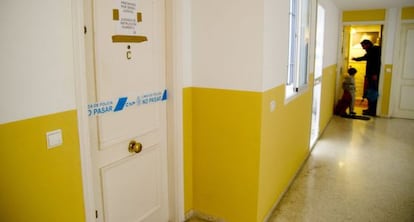Death of deprived Seville family may have been caused by chemical inhalation
Judge says husband, wife and daughter likely died after breathing gas produced by fumigation compound

The judge investigating the deaths of three members of the same family from the small town of Alcalá de Guadaíra, in Seville, says they most likely died from inhaling a gas produced by a chemical fumigating compound.
When the bodies of Enrique Caño, 61, his wife Concepción, 50, and their daughter Tamara, 14, were found dead at their home on December 14, it was initially thought they had eaten contaminated fish. The couple’s other daughter, 13-year-old Vanessa, was also taken seriously ill.
But post-mortem examinations of the bodies carried out by the National Toxicology Institute suggest the presence of aluminum phosphate, a gas produced when fumigation compounds come into contact with water or damp air. So far, the Andalusia regional High Court has yet to officially confirm the suspicion.
Aluminum phosphate is a chemical compound used by farmers as a pesticide. It is typically sold in tablet and compound form in packets or bottles. When it comes into contact with water or humid air, it releases a toxic gas called phosphine. Inhaled in large doses, and without immediate treatment, the chance of death is between 70 and 100 percent.
The police admit that death from phosphine inhalation is “the most probable hypothesis.”
The initial symptoms are nausea, vomiting, stomach pains, and diarrhea. The three victims all presented similar symptoms when they were taken to hospital, leading doctors to believe that they were suffering from gastroenteritis caused by eating contaminated food.
The story made headlines around Europe as a symbol of Spain’s ongoing crisis after Spanish media reported that the family had no income, and was living on out-of-date food after Caño lost his job as a plumber two years ago. Their house was seized by the bank, but they continued to live in the property as de facto squatters. Caño was reportedly a regular visitor to food stores at closing time, joining other unemployed locals in taking expired products from staff. He also earned money by collecting and selling secondhand clothes.
But when the family’s 13-year-old daughter Vanesa recovered from her illness, medics and police began to pursue other lines of investigation. Vanesa had eaten with her family, and then gone out with friends. When she returned, she found her mother, father, and sister already unconscious.
The police say that death from phosphine inhalation is just one of a number of “lines of investigation” but admit it is “the most probable hypothesis.” The authorities have yet to establish how the family might have been exposed to phosphine. Investigators say it is unlikely that the meal the family ate was contaminated by the gas. The most likely cause of death would be from inhalation.
So far, no bottles or packets used to store aluminum phosphate have been found in the family’s home. But police say they have found several bags in the bathroom containing plastic bottle tops that Caño collected from shops and factories, with the intention of selling them for recycling. One of the bags contained “many” bottle tops compatible with a type of bottle used to store aluminum phosphate.
Investigators say it is possible there were traces of the compound in the bottle tops, and that given the damp conditions in the bathroom, they released phosphine. “If the family didn’t know what they had in the house, and the symptoms could be confused with stomach poisoning, then they were doomed from the moment they breathed the fumes in,” says a judicial source.
Extended family members are now considering legal action against the regional health service. They say Vanesa called paramedics immediately, but despite the parents and children being violently ill, the decision was made not to take them to hospital. Again, media reporting put this decision in the context of cuts to health spending caused by the crisis.
Tu suscripción se está usando en otro dispositivo
¿Quieres añadir otro usuario a tu suscripción?
Si continúas leyendo en este dispositivo, no se podrá leer en el otro.
FlechaTu suscripción se está usando en otro dispositivo y solo puedes acceder a EL PAÍS desde un dispositivo a la vez.
Si quieres compartir tu cuenta, cambia tu suscripción a la modalidad Premium, así podrás añadir otro usuario. Cada uno accederá con su propia cuenta de email, lo que os permitirá personalizar vuestra experiencia en EL PAÍS.
¿Tienes una suscripción de empresa? Accede aquí para contratar más cuentas.
En el caso de no saber quién está usando tu cuenta, te recomendamos cambiar tu contraseña aquí.
Si decides continuar compartiendo tu cuenta, este mensaje se mostrará en tu dispositivo y en el de la otra persona que está usando tu cuenta de forma indefinida, afectando a tu experiencia de lectura. Puedes consultar aquí los términos y condiciones de la suscripción digital.









































